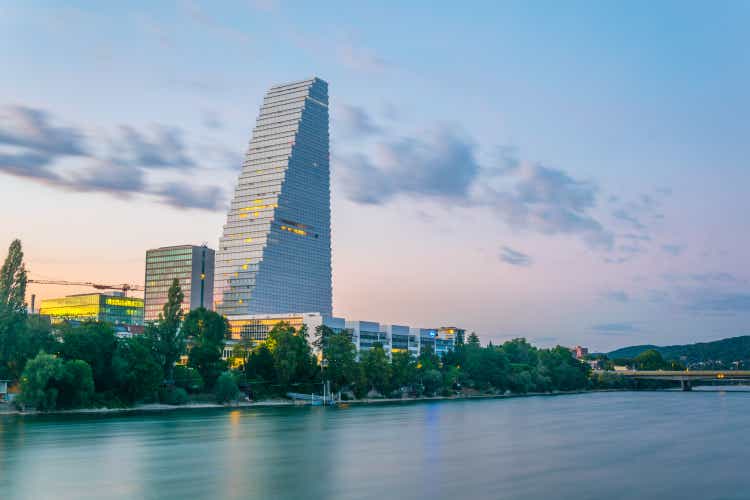trabantos/iStock via Getty Images
Roche’s (OTCQX:RHHBY) (OTCQX:RHHBF) Diagnostics Division head will take over as Group CEO, replacing incumbent Severin Schwan, effective March 15, 2023.
The Swiss company’s board intends to propose Schwan as new Chairman at the AGM in March 2023, as Christoph Franz has decided not to seek re-election to the board.
Roche’s H1 performance saw a boost from its diagnostics business and new medicines sales, and the company confirmed its FY22 outlook noting that it expects to further increase its dividend in Swiss francs.
H1 Core EPS grew 11% Y/Y (at constant exchange rates, or CER) to CHF11.76. The company said this includes positive effects of a patent dispute in Japan and the buyback of Roche shares from Novartis.
The Swiss pharma giant however, noted that in H2 core EPS is expected to be impacted by the decline of COVID-19 sales and a base effect from the resolution of several tax disputes that were recognized H2 2021 and will not recur in 2022.
H1 Group sales rose +5% to ~CHF32.3B Y/Y.
“We achieved good results in the first half of the year, thanks to the continued strong demand for our diagnostics base business and our new medicines to treat haemophilia, cancer and neurological disorders. Thanks to the ongoing renewal of our portfolio, we continue to grow despite biosimilars, whose impact declined further as expected,” said Roche CEO Severin Schwan.
Pharmaceuticals Division sales in H1 grew +3% Y/Y to CHF22.35B.
H1 sales of Haemophilia A therapy Hemlibra grew +30% Y/Y to CHF1.83B; while revenue from multiple sclerosis drug Ocrevus increased +17% to CHF2.91B. Sales of cancer drug Tecentriq increased +11% to ~CHF1.76B.
Roche said Hemlibra, Ocrevus, Evrysdi for spinal muscular atrophy, breast cancer treatment Phesgo and Tecentriq alone contributed an additional CHF1.5B in new sales.
The company added that as expected the impact of competition from biosimilars for its established cancer medicines Avastin, Herceptin and MabThera/Rituxan slowed down further (combined CHF1B of sales reduction).
H1 worldwide sales of Avastin declined -29% to CHF1.14B; while MabThera/Rituxan revenue declined -21% Y/Y to CHF1.12B.
Roche (OTCQX:RHHBY) (OTCQX:RHHBF) added that and sales losses due to biosimilars in the current year to be roughly CHF2.5B.
Sales from the Diagnostics Division in H1 grew +11% to CHF9.95B.
COVID-19 portfolio generated CHF3.1B in H1, compared to CHF2.5B in H1 2021.
The company expects the demand for COVID tests to likely decrease in Q3 2022.
Roche added that it expects sales of COVID-19 medicines and diagnostics to decrease by about CHF2B to around CHF5B.
Outlook: The company confirmed its FY22 outlook.
The company said sales are expected to be stable or grow in the low-single digits (at CER) and noted that excluding the effects (of biosimilar and COVID drugs/diagnostics impact) Group sales are expected to grow in the high-single digit range.
Meanwhile, Core EPS is expected to grow in the low- to mid-single digit range (at CER), including the accretive effect of the 2021 share repurchase.
Roche (OTCQX:RHHBY) (OTCQX:RHHBF) noted it expects to increase its dividend in Swiss francs further.
Image and article originally from seekingalpha.com. Read the original article here.

